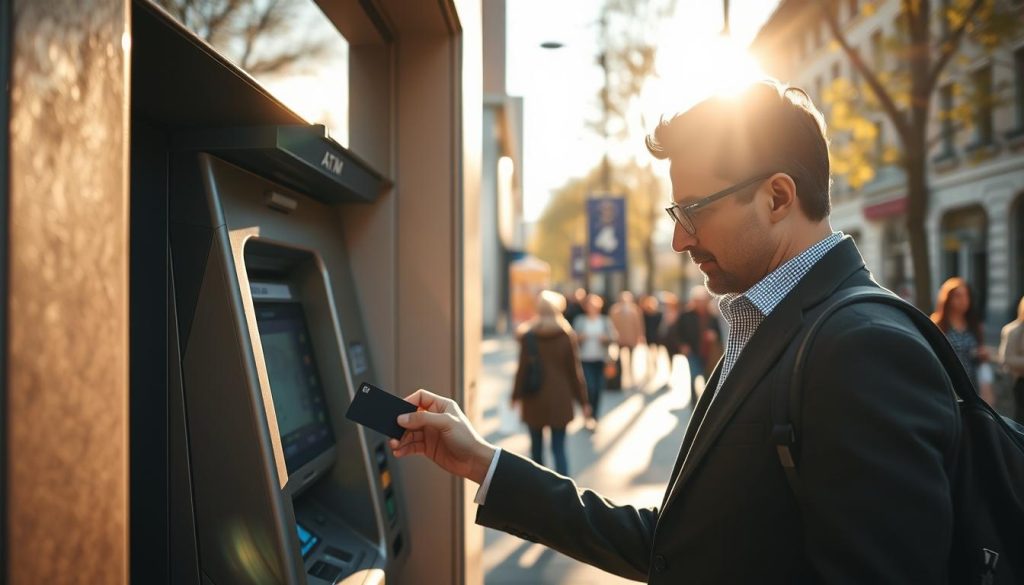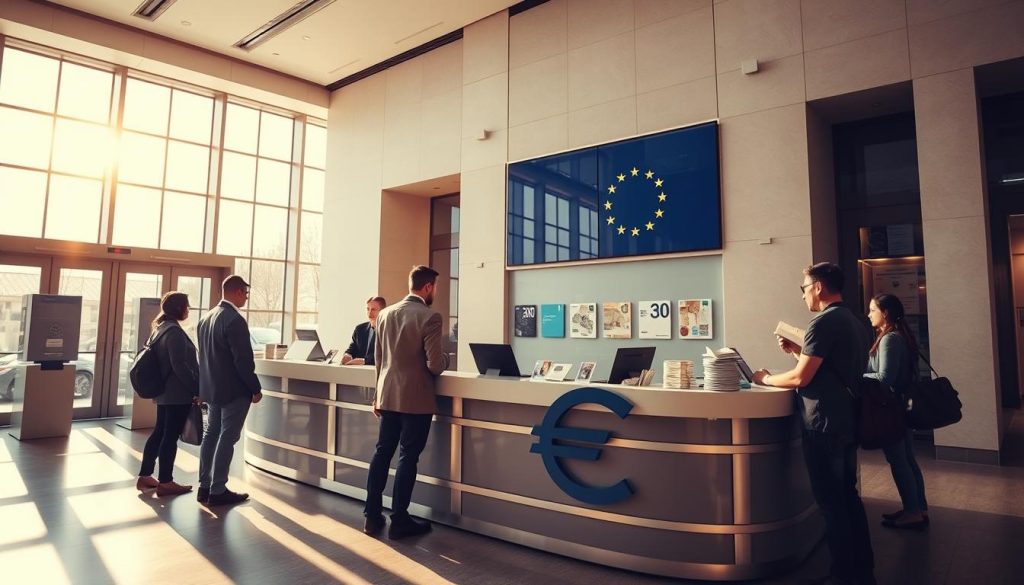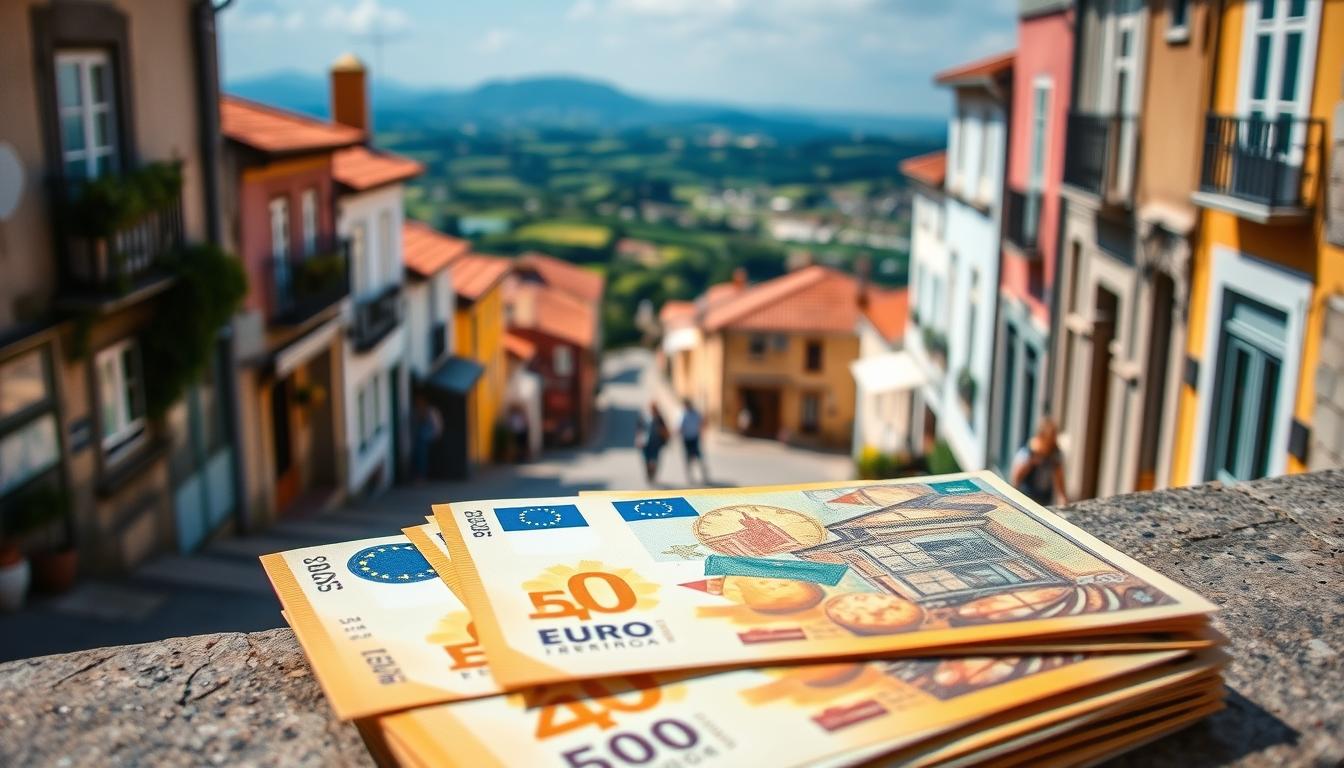Did you know that over 90% of transactions in Portugal are made using the euro? This makes it essential to understand how to manage your money effectively during your trip. The euro, adopted in 1999, is the official currency here, and it’s the only form of payment accepted nationwide.
Euro banknotes and coins feature unique designs that reflect Portuguese heritage. From the 5€ note to the 2€ coin, each piece tells a story. Knowing the conversion rate and understanding costs can help you budget wisely and avoid unnecessary fees.
In the following sections, you’ll learn about using cards, ATMs, and digital payment methods. These tips will ensure you have a smooth and stress-free experience managing your money in Portugal.
Understanding Portugal’s Official Currency and Its History
The euro’s introduction in 1999 revolutionized Portugal’s financial landscape. This change marked the end of the escudo, which had been the nation’s official currency since 1911. The transition to the euro simplified currency exchange and strengthened economic ties across Europe.
An Overview of the Euro Adoption
Portugal adopted the euro in January 1999, meeting the European Union’s strict economic criteria. By 2002, the escudo was completely phased out, and the euro became the sole currency in circulation. This shift not only streamlined transactions but also boosted economic stability.
The euro’s design reflects European unity. Banknotes feature windows, gateways, and bridges, symbolizing openness and connection. Coins, on the other hand, include unique national designs, showcasing Portugal’s rich heritage.
The Transition from the Escudo to the Euro
Before the euro, the escudo was pegged to the pound sterling and later the US dollar. However, inflation and economic challenges in the 1990s made the switch crucial. The escudo was replaced at a rate of 1,000 escudos to 1 euro, simplifying exchange rates for both locals and visitors.
Here are some key benefits of the euro adoption:
- Simplified currency exchange for international travelers.
- Enhanced economic stability and trade within the EU.
- Unique designs on banknotes and coins that celebrate European culture.
Understanding this history helps you appreciate the euro’s role in modern Portugal. Whether you’re planning a trip or managing finances, knowing the official currency’s background ensures a smoother experience.
Paying in Portugal: Cash, Cards, and Digital Wallets
Managing your money in Portugal is easier than you might think, thanks to a variety of payment options. Whether you prefer carrying cash, swiping a card, or using a mobile wallet, you’ll find plenty of flexibility to suit your needs. Here’s a breakdown of the most common methods and when to use them.

Cash Transactions and When to Use Them
While digital payments are on the rise, cash remains a reliable option in many situations. Small purchases, like a coffee or a pastry, often require physical money. Tipping service workers, such as taxi drivers or restaurant staff, is also easier with cash on hand.
In rural areas or family-owned businesses, you might find that card terminals are unavailable. Having some euros in your wallet ensures you’re prepared for these scenarios. ATMs are widely accessible, making it easy to withdraw cash when needed.
Card Payments and Mobile Wallet Options
For larger purchases or dining out, using a debit card or credit card is both convenient and secure. Most establishments, especially in cities, accept major cards like Visa and Mastercard. Contactless payments are also common, allowing you to tap and go without hassle.
Digital wallets, such as Apple Pay and Google Pay, are gaining popularity in urban areas. These platforms offer added security and speed, making them ideal for busy travelers. However, it’s always a good idea to confirm acceptance beforehand, as not all businesses support mobile payments.
Here are a few tips to make the most of your payment options:
- Carry a mix of cash and cards to cover all situations.
- Use ATMs from reputable banks to avoid high fees.
- Check for hidden transaction fees when using cards abroad.
- Keep small bills handy for tipping and small purchases.
By understanding these payment methods, you can enjoy a stress-free experience while exploring all that Portugal has to offer.
Managing Currency Exchange and Conversion Rates
Keeping track of exchange rates can make or break your travel budget. Whether you’re planning your trip or already abroad, understanding currency conversion is essential for managing your spending efficiently.
Using a currency converter tool is one of the easiest ways to monitor real-time rates. These tools provide up-to-date information, helping you plan your expenses and avoid surprises. Apps like Wise or XE are popular choices for travelers.
Why is this important? Knowing the conversion rate ensures you’re not overpaying for goods or services. For example, converting AUD to EUR before your trip can save you from unfavorable exchange rates at airports or hotels.
Here are some practical tips to keep in mind:
- Always check the rate before making a transaction to ensure accuracy.
- Avoid dynamic currency conversion (DCC) at ATMs or point-of-sale terminals, as it often includes hidden fees.
- Use online tools to compare exchange options and find the best deals.
By staying informed, you can make smarter financial decisions and enjoy a stress-free trip. Whether you’re converting dollars to euros or planning your daily budget, understanding currency conversion is your key to success.
Portugal: Ultimate Travelers Guide to Currencies & Payments
Navigating ATMs and banks in Portugal can save you time and money during your trip. Multibanco ATMs are widely available and offer reliable cash withdrawals. These machines are found in most cities and towns, making it easy to access your travel money whenever needed.
When using ATMs, always opt for those located inside banks or well-lit areas. This reduces the risk of theft or fraud. Additionally, check for any withdrawal fees before completing your transaction. Some banks charge lower fees, so it’s worth comparing options.
- Use Multibanco ATMs for secure and fee-friendly withdrawals.
- Avoid airport currency exchange counters, as they often have higher rates and fees.
- Check the exchange rate when you arrive to ensure you’re getting the best deal.
- Carry small bills for tips and everyday expenses.
Finding the Best Exchange Rates on Arrival
Securing the best rates for your cash starts with a little research. Before your trip Portugal, compare rates online to identify banks or exchange offices with competitive offers. Many travelers find that local banks offer better rates than tourist-focused exchange services.
Upon arrival, avoid exchanging large amounts of money at the airport. Instead, wait until you reach the city center, where rates are often more favorable. Always ask about fees and commissions to avoid hidden costs.
By following these tips, you can maximize your travel money and enjoy a stress-free experience managing your finances in Portugal.
Exploring Payment Options: Debit, Credit, and Prepaid Cards
Choosing the right payment method can make your travels smoother and more cost-effective. Whether you prefer a debit card, credit card, or a prepaid travel card, each option has its pros and cons. Understanding these differences helps you manage your finances efficiently while abroad.
Features and Fees Comparison
Debit cards are a popular choice for accessing cash from ATMs. They’re linked directly to your bank account, making them convenient for withdrawals. However, some banks charge foreign transaction fees, so it’s essential to check your bank’s policy before traveling.
Credit cards offer added security and are ideal for larger purchases. Many cards provide rewards like cashback or travel points. However, they often come with higher fees for cash advances or foreign transactions. Look for cards with no foreign transaction fees to save money.
Prepaid travel cards are a great alternative for budgeting. You load a specific amount onto the card, which can be used like a debit card. These cards often have lower fees and are widely accepted. However, they may have reload fees or limits on withdrawals.
Recommended Travel Money Card Providers
Here are some trusted providers to consider for your trip:
- Wise Multi-Currency Card: Offers low fees and real-time exchange rates. Perfect for frequent travelers.
- Chase Sapphire Preferred: A credit card with no foreign transaction fees and excellent rewards.
- NetSpend Prepaid Card: A budget-friendly option with easy reload options.
Before choosing a card, verify its acceptance in your destination. Most card Portugal options, like Visa and Mastercard, are widely accepted. Always check for hidden fees and compare features to find the best fit for your needs.
ATM Withdrawals and Security Tips for Travelers
Accessing cash safely is a top priority for travelers in urban areas. Whether you’re exploring bustling cities or quieter neighborhoods, knowing where to find reliable ATMs can save you time and money. Here’s how to ensure a smooth and secure atm withdrawal experience.

Locating Reliable ATMs in Major Cities
In most urban centers, Multibanco ATMs are widely available and trusted. These machines are often located inside banks, shopping centers, or well-lit public areas. Using bank-affiliated ATMs reduces the risk of fraud and ensures lower fees compared to independent machines.
When searching for an atm, avoid standalone machines in isolated locations. Instead, opt for those in busy areas or near bank branches. This simple step can significantly enhance your security during transactions.
Protecting Yourself During ATM Withdrawals
To safeguard your cash and card information, follow these practical tips:
- Check for skimming devices by inspecting the card slot and keypad before use.
- Shield your PIN entry to prevent prying eyes or hidden cameras.
- Decline dynamic currency conversion (DCC) to avoid unfavorable exchange rates.
- Withdraw only the amount you need for the day to minimize risk.
Additionally, always keep a backup card or cash in a secure location. This ensures you’re prepared in case of unexpected issues with your primary withdrawal method.
Avoiding Unauthorized Fees and Fraud
Some ATMs, especially those in tourist-heavy areas, charge high fees. Stick to Multibanco machines or those affiliated with reputable banks to minimize costs. Always check for withdrawal limits and fees before completing your transaction.
If you notice suspicious activity or unauthorized charges, contact your bank immediately. Most institutions offer fraud protection, but prompt action is key to resolving issues quickly.
By following these tips, you can enjoy a hassle-free experience accessing cash in your destination. Whether you’re in a bustling city or a quieter neighborhood, these strategies will help you stay secure and prepared.
Budgeting Your Trip: Typical Costs and Currency Planning
Planning your budget for a trip doesn’t have to be stressful—here’s how to make it work. Understanding typical prices for dining, accommodations, and entertainment can help you enjoy your adventure without overspending. Let’s break down what you can expect and how to make the most of your spending.
Average Prices for Dining, Accommodations, and Entertainment
When it comes to dining, a meal at an inexpensive restaurant typically costs around $8 to $12. For a mid-range experience, a three-course meal for two averages $40 to $50. Coffee lovers can enjoy a cappuccino for about $1.50, while a bottle of local wine is around $5.
Accommodations vary widely. A mid-range hotel might cost €100 per night, while budget-friendly hostels offer private rooms starting at $400 per month. Public transport is affordable, with one-way tickets ranging from €1.25 to €2.50 and monthly passes costing €35 to €55.
Entertainment options are equally diverse. Many museums and churches offer free entry, while gym memberships start at €30 per month. By knowing these prices, you can plan your spending more effectively.
Budgeting Strategies to Stretch Your Travel Money
To make the most of your budget, consider these tips:
- Use public transport passes instead of single tickets to save on daily costs.
- Opt for daily lunch specials, which are often the most economical meal choice.
- Stay in budget accommodations like hostels or rentals outside city centers.
- Monitor your expenses with apps like Wise or XE to adjust your budget in real time.
By planning ahead and spending wisely, you can enjoy your trip without breaking the bank. Whether you’re exploring cities or relaxing by the coast, these strategies will help you stay on track.
How to Save on Transaction and Hidden Fees
Understanding how to avoid unnecessary fees ensures you get the most out of your travel budget. Whether you’re using ATMs, cards, or exchanging cash, small savings can add up significantly. Here’s how to keep more money in your pocket during your trip.

One of the most common fees you’ll encounter is the transaction fee. This charge applies when using your card abroad or withdrawing cash from an ATM. Some banks also add a foreign exchange fee, which can range from 1% to 3% of the transaction amount.
To minimize these costs, choose ATMs affiliated with reputable banks. Avoid standalone machines in tourist-heavy areas, as they often charge higher fees. Additionally, decline dynamic currency conversion (DCC) to bypass unfavorable exchange rates.
Here are some practical tips to save on fees:
- Use a card with no foreign transaction fees, like those from Charles Schwab or Wise.
- Compare currency exchange rates at local banks instead of airport counters.
- Plan your cash withdrawals to reduce the number of transaction fees incurred.
- Carry a mix of payment methods to avoid relying solely on one option.
By pre-planning and choosing low-fee options, you can significantly reduce unnecessary expenses. These small savings can make a big difference, allowing you to enjoy your trip without worrying about hidden costs.
Using Digital Solutions and Travel Money Apps
Digital travel money apps have revolutionized the way you manage your finances abroad. With features like real-time conversion and low fees, these tools make it easier than ever to stay on top of your spending. Apps like Revolut and Wise are leading the charge, offering seamless solutions for travelers.
Benefits of Apps like Revolut and Wise
One of the standout features of these apps is their ability to convert currencies in real time. For example, if you’re converting aud eur, you’ll get the mid-market rate without hidden fees. This ensures you’re always getting the best deal.
Another advantage is the low ATM withdrawal fees. Unlike traditional banks, apps like Revolut charge minimal fees, saving you money on every transaction. Plus, you can monitor your spending directly from your phone, making budgeting a breeze.
Here’s a quick overview of what these apps offer:
- Real-time currency conversion using a converter that updates instantly.
- Virtual cards for secure online shopping and international spending.
- Low fees for ATM withdrawals and foreign transactions.
- Easy-to-use interfaces that simplify the way you manage your travel money card.
When compared to traditional banking cards, apps like Revolut and Wise offer more flexibility and cost-effectiveness. They’re designed with travelers in mind, ensuring you have everything you need for a hassle-free trip.
To use these apps safely, always enable two-factor authentication and keep your login details secure. This way, you can enjoy the benefits of digital solutions without worrying about fraud.
Practical Tips for Exchanging Currency Before Departure
Preparing your finances before your trip can save you time and money. Exchanging some dollars for euros before you leave ensures you’re ready to explore without stress. Here’s how to make the process smooth and cost-effective.
Exchanging Dollars for Euros in the U.S.
Buying euros before your trip is a smart move. Many banks and currency exchange services offer competitive rates. Avoid airport kiosks, as they often charge higher fees and provide unfavorable rates.
Here are some options to consider:
- Banks: Most banks allow you to order euros in advance. Check for a low fee and a favorable rate.
- Online Services: Companies like Wise or CurrencyFair offer real-time rates and low fees.
- Prepaid Cards: Load euros onto a travel card to lock in a rate before departure.
Always compare rates and fees to find the best deal. Planning ahead ensures you start your trip with the right amount of cash.
Managing Leftover Euros Once You Return
Don’t let leftover euros go to waste. Here are some practical ways to use or exchange them:
- Save for Future Trips: Keep euros for your next visit to a eurozone country.
- Exchange at Home: Many banks offer buy-back services for unused currency.
- Donate: Some charities accept foreign currency donations.
Coins are harder to exchange, so try to spend them before leaving. This simple step ensures you get the most value from your leftover euros.

| Option | Pros | Cons |
|---|---|---|
| Banks | Secure, reliable rates | May have higher fees |
| Online Services | Low fees, real-time rates | Requires advance planning |
| Prepaid Cards | Lock in rates, easy to use | Reload fees may apply |
By following these tips, you can ensure a smooth financial experience during your travels. Whether you’re exchanging dollars for euros or managing leftover currency, planning ahead is the key to success.
Ensuring Secure and Hassle-Free Currency Management in Portugal
Staying safe with your money abroad requires a mix of smart strategies and awareness. Whether you’re exploring a bustling city or a quiet destination, protecting your funds is key to a stress-free trip. Here’s how to manage your finances securely while traveling.
Strategies to Keep Your Money Safe Abroad
Start by splitting your cash and cards. Carry only what you need for the day and store the rest in a secure location, like a hotel safe. This minimizes risk if you lose your wallet or encounter theft.
Use secure banking apps to monitor your spending in real time. Apps like Wise or Revolut offer low fees and instant notifications, helping you track every transaction. This is especially useful when dealing with portuguese currency.
When using ATMs, choose those inside a bank or well-lit areas. Avoid standalone machines in unfamiliar city spots, as they may have higher fees or be less secure. Always shield your PIN and check for skimming devices.
Here are additional tips to ensure your money stays safe:
- Keep a backup card in a separate location.
- Use money belts or hidden pouches for extra security.
- Decline dynamic currency conversion (DCC) to avoid unfavorable rates.
- Inform your bank about your travel plans to prevent card blocks.
By following these strategies, you can enjoy your trip without worrying about your finances. Whether you’re handling portuguese currency or using digital tools, staying prepared is the best way to ensure a smooth experience.
Conclusion
Properly managing your finances while traveling ensures a smooth and enjoyable experience. Understanding exchange rates and choosing the right payment methods, like a credit card or digital wallet, can save you time and money. Planning ahead helps avoid hidden fees and overspending, making your travel budget go further.
From using low-fee digital solutions to practicing safe ATM withdrawals, these tips can enhance your financial security. Whether you’re converting currency code eur or exploring new destinations, careful planning ensures peace of mind.
Enjoy your adventure with confidence, knowing you’ve prepared well for your financial needs. Happy travels!
The above is subject to change.
Check back often to TRAVEL.COM for the latest travel tips and deals.
Here are some Tours & Sightseeing suggestions that might pique your interests!






